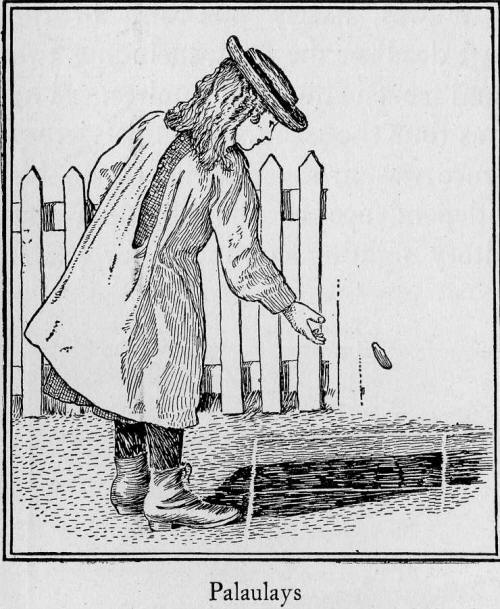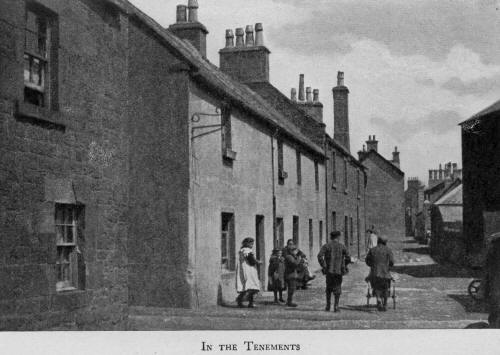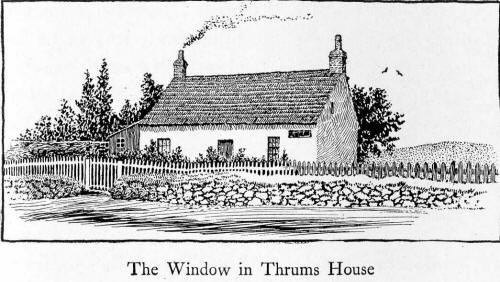|

IN nearly all the novels with which Mr.J.M.Barrie has charmed the readers
of two hemispheres, Thrums is the home of the characters introduced, and is
the scene of most of the comedies and tragedies the author delights to
depict.
As the background of the entertaining mingling of life's lights
and shadows which is characteristic of his stories, it is a great
satisfaction to find that Thrums is a real place and that it accords in many
ways with
Mr.
Barrie's descriptions. Its name on the maps is Kirriemuir, though the
inhabitants commonly shorten this to simply Kirrie; and you will find it
about sixty miles north of Edinburgh, at the end of a little branch railroad
that leaves the main line at Forfar and climbs half a dozen twisty miles
toward the hills.
The industry that makes and supports the town is weaving, and in the
hollow, where a little stream winds through the village, are two great stone
mills that look very substantial and prosperous. They do work which fifty
years ago was done wholly in the homes. Then, one would have heard the
rattle of the hand-loom from every cottage, but now the mills furnish
employment for most of the town inhabitants, and, though there is loss of
picturesqueness, the people are undoubtedly better off. A few still cling to
the ways of their forefathers, and from an occasional house the old-time
clack of weaving even yet comes to the ears of the passer. However,
competition with machinery is a losing struggle, and the hand-workers grow
fewer every year.
As a rule the people appeared neater and thriftier than those of the
average Scotch town. There were none of the barefoot women and few of the
barefoot children that one finds plentiful in most villages. Making a living
is not as oppressive a grind in Kirrie as it might be. If a street musician
strays into the
place, he is sure to carry away a
liberal weight of small coins, and when a circus takes possession of the
little square, it is always well patronized.
This small paved square, bounded about by the various shops of the
tradespeople, with the tiny town hall on one side, is the village centre.
From it the houses streak away in the most chancing fashion up the valleys
and along the hillsides. No doubt this haphazard character is due to the
uncertain and hum-mocky lay of the land. Wherever you walk you are either
going up or down a hill, and the hill is likely to be steep at that. The
streets are crooked and have unexpected turns in them, and there are
frequent little lanes that have an odd way of jerking around corners and
dodging under houses.

The dwellings are nearly all of red sandstone from a quarry high on the
hillside. In most cases the houses are weather-darkened and battered, though
some of the older cottages have walls coated with plaster, and certain
others get periodical brightenings of whitewash. To the last class belongs
the house that of all others in Thrums is the centre of the Barrie interest.
You go down a steep hill from the town square, cross the stone brig that
spans the burn, and at once begin the ascent of the famous brae (the Scotch
word for a steep roadway or hillside). When you get to the elbow of the
brae, there is Hendry's cot before you at
the top of
the hill. It is a one-story house with a narrow garden in front, and in its
gable is a tiny window that you feel sure is Jess's window as soon as you
see it. This window looks easterly down the brae and over the town ; and it
is remarkable when one goes about the village and the surrounding
hill-slopes how often the cot at the top of the brae is in sight, and how
the little window seems watching you as if the house had an eye. In Mr.
Barrie's description the cottage roof is of thatch, with ropes flung over it
to keep it on in wind. But now the roof is rudely slated. Thatch is out of
date in Kirriemuir. Yet there was one rusty line of cottages on a
neighboring hill that still retained its ancient coat of straw, and the
straw was secured from the clutches of the gales by strips of board fastened
on it.
Hendry's cot had tenants, and they were plainly of a thrifty turn of
mind, for a black sign hung on the house walls that labelled the place " A
Window in Thrums," and announced that souvenirs and lemonade were for sale.
If you choose to go up the short walk through the garden and rap at the
door, the dwellers within will readily show you the house interior. There is
not much to see—just two small rooms with a bit of a passage between. To the
right is the kitchen, with its fireplace, bed, table, and a few other
primitive furnishings. To the left is "the room," in which is a
second bed, several haircloth chairs, and a spreaded table
with an elaborate lamp on it, and a few books laid around the edges in
regular order.
Upstairs is an unfinished attic that you climb to by a step-ladder
through a trap-door, exactly as in the days when the schoolmaster boarded in
the house. There is very little save dust and rubbish in the attic now, but
it is lighted by the little window that gives the name to Mr. Barrie's book,
though, for the sake of realism, this window should be in the kitchen below.
The working class in Thrums had but a poor opinion of the novelist's
books. Nothing happens in "A Window in Thrums," they informed me
deprecatingly, but what they saw every day. The talk was the talk they heard
next door — mere "bairn's havers," they said, "juist Kirrie balderdash."
They thought it was unquestionably great rubbish, and accounted for its
popularity by the theory that chance had made it a fad; after this
factitious interest had faded they had no doubt other folks would be as sick
of the stuff as they were.
Nor were they suited with the author himself. He is not large enough, is
too retiring, goes about with his hands behind him, looking straight ahead
as if he lived in some dream world of his own—and how could you expect a man
of that size and manner to write anything worth while?
Among those who thus criticised Mr. Barrie was a woman who told me a long
story of how she and her parents and children and grandchildren had all
lived in the little Window in Thrums house. They had only recently moved out
of it, and she supposed they were the real heroes and heroines of Barrie's
tale. Like enough she, herself, was meant for Jess — if she wasn't, she
didn't know who was. Then she said she would tell me the true origin of the
title of the book. One stormy night some young fellows set out to rob a
neighboring orchard and they wanted her son to go out with them. They knew
he slept in the attic, and so they took some apples and came into the garden
and threw them up at the little window to arouse him. Her son was away, as
it happened, and pretty soon she and her sister, sleeping below, heard the
apples come rolling down through the trap-door from the vacant apartment
overhead. They were scared, and they awakened their father, who found the
little window broken, and the rain pouring in. He called down to them how it
was — and what should he do? In a corner of the loomshop at the far end of
the house were a lot of "thrums"—waste ends of the warp which have to be cut
off every time the weaving of a roll of cloth is finished. It was these
thrums they used to stop the window and keep the rain out. That made "The
Window in Thrums," or, more
properly, "the thrums in
the window." I fancy this origin of the title would be news to Mr. Barrie
himself.
The first nine years of his life the novelist lived in "the tenements," a
block of old, plastered houses which are the homes of the humblest of the
weavers. It was there he picked up his close knowledge of the language and
ways of the poor, and his keen feeling for all their traits, from petty
pride up to unconsciour heroism. In later years his abode was in a
substantial stone house just across the road from Hendry's cot at the top
of the brae. Curiously enough, Mr. Barrie has never been inside the
cottage he has made famous. But his readers and admirers go through it with
sufficient care to make up for his delinquency, and they spare no effort to
make the little house fit his descriptions in every detail.
It is a little remarkable how many places can be identified in the
Kirriemuir region as the veritable ones described in the book. First, of
course, is the cot and the little window, and the brae with its carts and
its people always going up and down. Then, near by, is the steep hillside of
the commonty bounded about with hedgerows, and crisscrossed with uncared-for
dirt paths. Here the children play, and here the women still come at times
to dry their washing. T'nowhead farm and its pigpen are not far away, and at
the other side of the town is the auld licht manse
that was the home of "The Little Minister." The burying-ground road still
climbs to the hillside cemetery with all its old-time straightness, and on
the village borders is "The Den," of which so much is made in "Sentimental
Tommy." This den, or, to use the English equivalent for the word — this
ravine, is a bit of meadow hemmed about with steep, grassy ridges and rocky
precipices. The villagers gather in the den every pleasant summer evening
and lounge on the grass, or loiter along the walks, or play games and join
in a Highland dance to the music of the village band.
One of the people whom I met in Kirriemuir was the dulseman. He was the
same whom Hendry used to patronize, and I saw him every evening with his
barrow on the square. He was a very stolid, slow sort of person, whom
nothing short of an earthquake could have moved to the least excitement. On
his barrow he carried a long box that held a bushel or two of the seaweed,
and a shorter box that contained a couple of kettles full of buckies
(sea-snails) which he had boiled with a flavoring of salt that day. The
evening loiterers bought and ate these things much the same as our loiterers
buy and eat peanuts.
When a Kirrie man approached the dulse-barrow, he turned sidewise to it
and said, "Penny's worth o' buckies," and the dulseman scooped up a tin cup
full
and emptied them into his customer's coat
pocket. Then the man helped himself to a pin out of a rusty tray in the
bucky box, or pulled one out of the bottom of his vest, and went over to the
curbing, where he talked with his friends, and at the same time extracted
the morsels from their shells. The shells were dropped on the paving of the
square, and it was astonishing what a strewing of them there was by the end
of the evening.
If a man bought dulse, the vendor picked up his fingers full twice for a
bawbee (halfpenny) and stuffed it in the man's pocket for him to nibble at
leisure. When a woman bought, she received her seaweed in her apron, while
the children usually carried theirs off in their hats. I was told that
buckies were not good for one's stomach — they only pleased the palate, but
that the dulse was medicinal, and helped digestion. I tried a bit of the
seaweed one evening, and, except that it was leathery, and that its peculiar
salt-water taste stayed in my mouth for an hour afterward, it was not bad. I
did not get up sufficient courage to try the buckies. When twisted out of
their shells, they looked too like dark earthworms to be appetizing.
The most old-fashioned of all the Thrums dwellings were those that made
the line of cottages under the thatched roof. In the far end of this line of
cottages lived Jimmie Donaldson and his granddaughter.
Jimmie was a telegraph boy, and, in spite of his ninety
years, was always ready to run with messages night or day. He thought
nothing of a six or eight mile tramp. He was a kindly, talkative slip of an
old man, very poor, yet too independent to take a tip for small services.
His work brought him only intermittent wages, and this fact often made him
so downhearted that he found it necessary to cheer himself up by spending
what he earned for occasional drops of liquor. The granddaughter worked in
the mill, and it was she who was the mainstay of the household.
Jimmie had three rooms, but as one was a rude scullery that looked like a
cellar, and another a loft used only for storage, the little kitchen was
practically the home and all of it. This kitchen had a tiny fireplace, two
small tables, a tall clock, a few chairs that only the greatest care would
coax to stand level on the uneven dirt floor, and some other odds and ends.
Two box beds filled one side of the room. A great many of the Kirrie
kitchens had box beds in them. This type of bed, as its name signifies, is
literally in a box, but the box is of enormous size and extends from floor
to ceiling, and the lid instead of being on the top is on the side fronting
the room, and takes the form of double doors that fold back to give
convenient entrance. The idea is that you can step in, pull the doors to,
and prepare for bed without its making any
difference
whether the room is occupied or not. After you are under the clothes you
push the door open and get some air to breathe.
Old-fashioned people believe that the box bed has special advantages in
time of sickness ; for if the patient wishes quiet and darkness, it is only
necessary to close the doors and the invalid is shut away from the outer
world completely, with no trouble at all.
In the kitchen that I have described the telegraph boy, Jimmie, and his
granddaughter cooked, ate, washed, made their toilets — did everything. But
Jimmie was satisfied. He said a doctor had told him that people who slept in
a box bed and had a thatch roof overhead and a dirt floor underfoot lived
the longest. He was much interested in the "States," and said he had two
daughters over there, one in Meriden, Con., and the other in Mish. I don't
know what he thought Con. and Mish. were, but I recognized Connecticut and
Michigan.
My final sight of Jimmie was on the last evening of my stay in Kirriemuir.
I was in the stationer's shop on the square when the old man came in and
held out a grimy hand for me to shake. His face was red, for he had been
having a dram or two, and he was inclined to take a dismal view of life.
He'd only had "one telegram the week, only a saxpence, and a man could no
live on that."
The stationer offered him his snuff-box, and Jimmie took a pinch, but it
did not revive his spirits, and his farewell to me was full of dubious
foreboding.
"I shall never see you again," he said.
"Oh, perhaps you may," I responded, with an attempt at cheerfulness.
"Will you come next year?" he inquired. "But I won't be here if you do,"
he added. "I'll be in hell then."
He shook hands once more, said "Good-by," and went out on the street.

|

